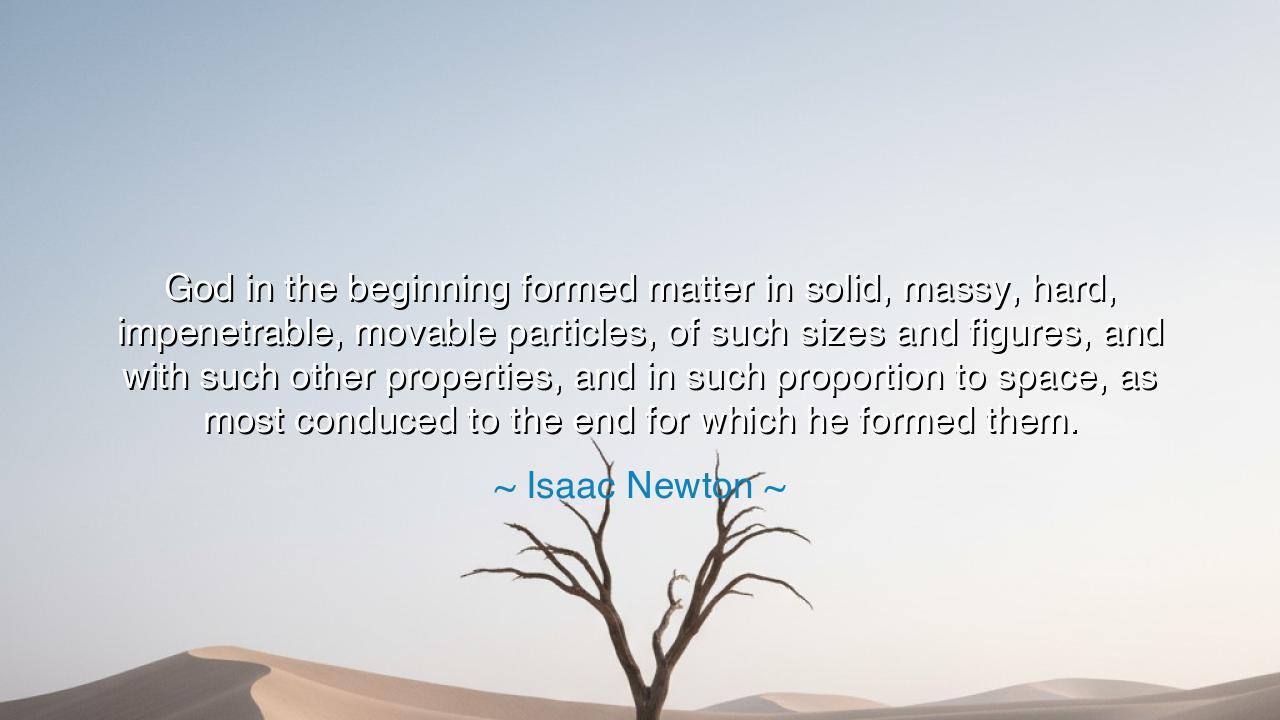
God in the beginning formed matter in solid, massy, hard
God in the beginning formed matter in solid, massy, hard, impenetrable, movable particles, of such sizes and figures, and with such other properties, and in such proportion to space, as most conduced to the end for which he formed them.






"God in the beginning formed matter in solid, massy, hard, impenetrable, movable particles, of such sizes and figures, and with such other properties, and in such proportion to space, as most conduced to the end for which he formed them." These words, spoken by the great Isaac Newton, reflect not only his understanding of the natural world but also his deep reverence for the divine design behind it. Newton, the brilliant mind who unlocked the secrets of gravity, motion, and the very laws that govern the universe, speaks here of God’s creation—the intricate arrangement of matter and space that allows the world to function as it does. To Newton, the world was not a random chaos of particles, but a carefully crafted system, each part designed with purpose and order.
In the ancient world, the question of creation was often seen as a divine mystery—an act of the gods that shaped the world into existence. The Greeks, such as Plato and Aristotle, speculated that the world was not made by chance, but by a divine craftsman who infused the universe with rational order. Plato’s Timaeus describes the world as the work of a divine creator, who shaped the cosmos from an eternal, formless material into a perfect and harmonious order. Aristotle, in turn, sought to understand the principles of motion and change that governed the natural world. Newton’s assertion that God formed matter with precise qualities and proportions echoes this ancient understanding, where the natural world is not a product of randomness but of an intelligent design.
Newton's insight into matter—its particles, their size, shape, and motion—draws upon the same deep wisdom that guided ancient thought. Just as the ancient philosophers searched for underlying principles that connected all things, Newton's scientific genius sought to unravel the very structure of the universe. But unlike the philosophers of old, Newton had the tools of empirical observation and mathematical calculation at his disposal. His laws of motion and his theory of gravity were not simply abstract ideas but laws that could be tested, measured, and proven. The particles of matter that Newton speaks of, though invisible to the naked eye, were the building blocks of all physical phenomena, a concept that would shape the course of science for centuries to come.
Consider the example of Archimedes, the great Greek mathematician and inventor. Archimedes’ work on levers and buoyancy laid the foundation for much of what Newton would later build upon. Archimedes, like Newton, understood that the laws of nature were not random but governed by mathematical principles that could be discovered through reason and experimentation. His famous exclamation, "Eureka!", upon discovering the principle of buoyancy, shows how the discovery of nature's design brings us closer to understanding the divine order. Newton’s work, however, took this to new heights, unifying the celestial and terrestrial realms under the same laws of physics. Like Archimedes, Newton recognized that understanding the world’s structure was a means of appreciating the grandeur of its creator.
Newton's vision of God’s design speaks to a fundamental truth about the world: that it is not random or chaotic, but ordered and purposeful. The universe, in all its vast complexity, is like a finely tuned machine, each part working in harmony to ensure the whole functions as it should. The particles of matter, from the smallest atoms to the largest galaxies, are not just scattered randomly; they have been placed exactly where they need to be, with specific properties and proportions, to allow life to flourish. Newton's view of the divine design mirrors the ancient idea of cosmic order, where every element of the universe, however small, has a role to play in the greater scheme of existence.
The lesson Newton imparts is one of deep reverence and gratitude for the world around us. When we look at the natural world—at the stars, the trees, the rivers, the very particles that make up our bodies—we are witnessing not the result of chance, but the expression of a divine will. It is not enough to observe the laws of nature as cold, mechanical principles. We must also see them as the manifestation of something greater, a wisdom that governs not just the cosmos but our very lives. The world around us, in all its beauty and complexity, is a gift—a reflection of the divine intelligence that crafted it.
In your own life, strive to recognize the order and purpose that surround you. Just as Newton saw in the particles of matter the careful design of a higher power, so too can you find purpose and meaning in your everyday actions. Do not view your life as a random series of events, but as part of a greater design that you can contribute to. Whether in your work, your relationships, or your personal growth, remember that your actions, like the particles of the universe, are part of a much larger and more intricate system. Seek to understand the laws of nature and wisdom that govern not just the world around you, but the inner workings of your own soul. Through this understanding, you can live more harmoniously with the world and find deeper meaning in all that you do.






AAdministratorAdministrator
Welcome, honored guests. Please leave a comment, we will respond soon